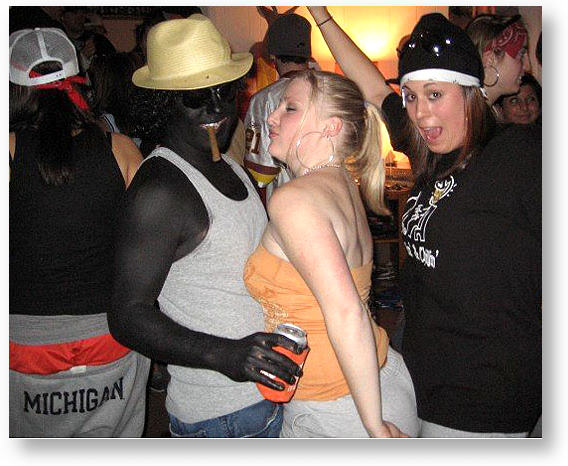My fellow sociologist blogger Jessie at Racism Review has an excellent writeup on a new study conducted by education professors Brendesha M. Tynes and Suzanne L. Markoe entitled, “The Role of Color-Blind Racial Attitudes in Reactions to Racial Discrimination on Social Network Sites.” In studying the notes written by people on popular social networking sites such as Facebook, the authors find that people who have colorblind racial attitudes were actually less likely to find racial theme party images offensive. The abstract of their study reads:
This study examines associations between responses to online racial discrimination, more specifically, racial theme party images on social network sites and color-blind racial attitudes. We showed 217 African American and European American college students images and prompted them to respond as if they were writing on a friend’s “wall” on Facebook or MySpace.
Reactions to racial theme party images were not bothered, not bothered-ambivalent, bothered-ambivalent, and bothered. A multinomial logistic regression revealed that participants differed in their reactions to the images based on their racial group and color-blind racial ideology. European Americans and participants high in racial color blindness were more likely to be in the not bothered reaction group.
Further, these students were more likely to condone and even encourage the racial theme party practice by laughing at the photos and affirming the party goers. Conversely, those low in color blindness were vocal in their opposition to the images with some reporting that they would “defriend” a person who engaged in the practice.

For those who have been reading this blog for a while, these findings should come as no surprise. Nonetheless, I am grateful to Professors Tynes and Markoe for doing this study and articulating the the relationship between having colorblindness and racist attitudes. We only have to look at the recent controversies about the racial tensions at the University of California campuses and other colleges around the country (along with past incidents of blackface racism) to see real-world examples of how being colorblind really means being racially blind.
Hopefully this study will help make all of us see that as an individual-level and interpersonal perspective and ass an institutional basis for public policy, colorblindness is not only a dismal failure but in many ways, hinders our nation’s quest for true and meaningful racial/ethnic equality and justice.
